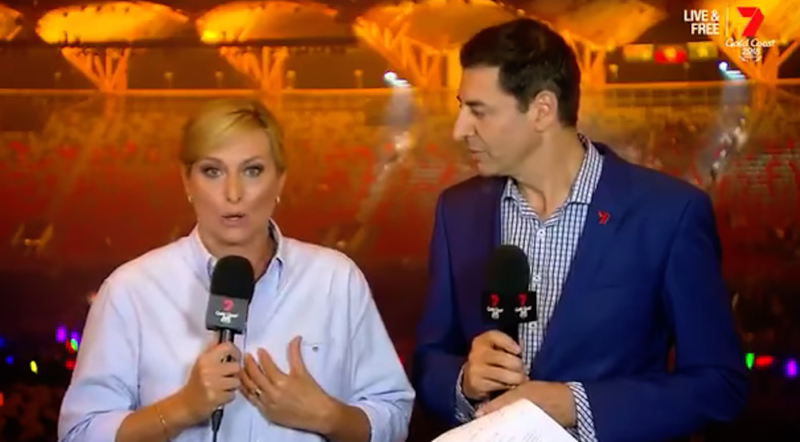Johanna Griggs and Seven claim they were never properly briefed on Comm Games Closing Ceremony broadcast plan
Seven has hit back at accusations it knew the broadcast schedule for the Commonwealth Games Closing Ceremony all along – including the decision to exclude footage of the athletes entering the stadium – after an article published by the ABC suggested that had been the case.
ABC News Radio presenter Tracey Holmes published an article yesterday telling readers Seven was aware athletes would be “largely snubbed” from the closing ceremony as they had received a minute-by-minute breakdown of the event 24 hours prior to launch.



It’s even more disgraceful if 7 just assumed what would be shown. It’s highly unlikely they haven’t been in discussions about this for months. Are they also saying nobody piped up and asked “what is the plan for the athletes?” Come on 7, don’t treat your viewers with such contempt.
More excuses to follow the original excuses. The Seven Network was not only the local rightsholder (which confers special privileges), but was also a partner in the host broadcaster itself along with NEP and Sunset+Vine. If Johanna Griggs didn’t know what was going on, that’s down to nobody but herself and her handlers at Seven, so continuing to flap her gums about it makes her look even sillier each day. Using the line “We assumed …” is telling. It’s also noticeable that nobody else at Seven has put their name to this nonsense.
Seven may not have been properly briefed but it seems they also didn’t ask some simple questions.
As a viewer it was demonstrably a night for a parade of local and games politicians, ie officialdom, the ones who are supposed to be managers in the background. One or two OK, but taking up so much of the show was boring viewing. Not only that but the Australian politicians/officials were over-self congratulatory, cringe-making. I’ts not just the sun that makes a place special, hopefully it was also the local welcome – AND good management of a big event, including the closing ceremony.
BIG mistake by organisers: not including athletes front and centre in the closer.
But I can’t quite credit that, as Games broadcaster, 7 did not notice or question the absence of athletes on the rundown or in briefings. The absence clouded what had been largely a very good coverage by 7 of the actual games. There was even a noticeable retreat, except in the swimming, from that residual Australia-mostly-focus that still bedevils good sports coverage here.
Birmingham videos was a booster at the end, great energy (and not from the sun), good luck!
So Seven are saying, their closing ceremony director and 2nd director knew nothing of the program line-up?
This goes against everything a director does to prep themselves for the show ahead.
Seven are in protect mode. Don’t listen to their fake comments
Did other broadcasters miss out too or was 7 too keen to show MKR so weren’t too worried about it?
One wonders when Seven were briefed.
Months before the event? Weeks before the event? Days before the event? Hours before the event?
Don’t forget that this was an international event and broadcast. It involved thousands of people. It would have required the sign-off of dozens of bodies. I doubt the local broadcaster would have got a say (unlike like the local organising body).
So what if some Seven staff were used. On that night those staff would have been hired to operate cameras and equipment as per the director’s instruction, in effect they were not Seven employees that night but sub-contractors – a not uncommon arrangement. The Seven deal was probably a form of contra to lower the rights costs and undoubtedly would have had zero creative input or control.
And no, I don’t work at Seven and never have. But I do know a bit about broadcasting.
It’s the Commonwealth Games, i.e. a totally meaningless event, who freaking cares